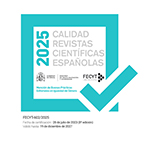La formación de periodistas para la democracia: el papel de la prensa no diaria en España (1975-1982)
Resumen
El ejercicio del periodismo experimentó una profunda y continua renovación en la prensa no diaria española durante los años de la transición política a la democracia. En este artículo se presentan las interpretaciones de esos cambios a partir de la visión de los profesionales que producían los proyectos editoriales. Los resultados han sido obtenidos a partir de grupos focales de discusión con profesionales de la comunicación en activo en publicaciones no diarias de la época (1975-1982). Los focus groups permiten concluir que la formación, muchas veces autodidacta, de los profesionales influye en las consideraciones deontológicas que supone la indistinción entre periodista y militante, característica del periodo de la dictadura y de cambio político. Como consecuencia de ese estilo de periodismo, la prensa no diaria se disputa la hegemonía de los medios del movimiento en la formación de la opinión pública. Sin embargo, según estos testimonios, la mayoría de los proyectos editoriales no diarios con objetivos políticos no sobreviven a la llegada de una prensa diaria profesionalizadora después de 1976, ejercida mayormente por profesionales formados en escuelas y universidades de Periodismo.
Descargas
Descarga artículo
Licencia
La revista Estudios sobre el Mensaje Periodístico, para fomentar el intercambio global del conocimiento, facilita el acceso sin restricciones a sus contenidos desde el momento de su publicación en la presente edición electrónica, y por eso es una revista de acceso abierto. Los originales publicados en esta revista son propiedad de la Universidad Complutense de Madrid y es obligatorio citar su procedencia en cualquier reproducción total o parcial. Todos los contenidos se distribuyen bajo una licencia de uso y distribución Creative Commons Reconocimiento 4.0 (CC BY 4.0). Esta circunstancia ha de hacerse constar expresamente de esta forma cuando sea necesario. Puede consultar la versión informativa y el texto legal de la licencia.










